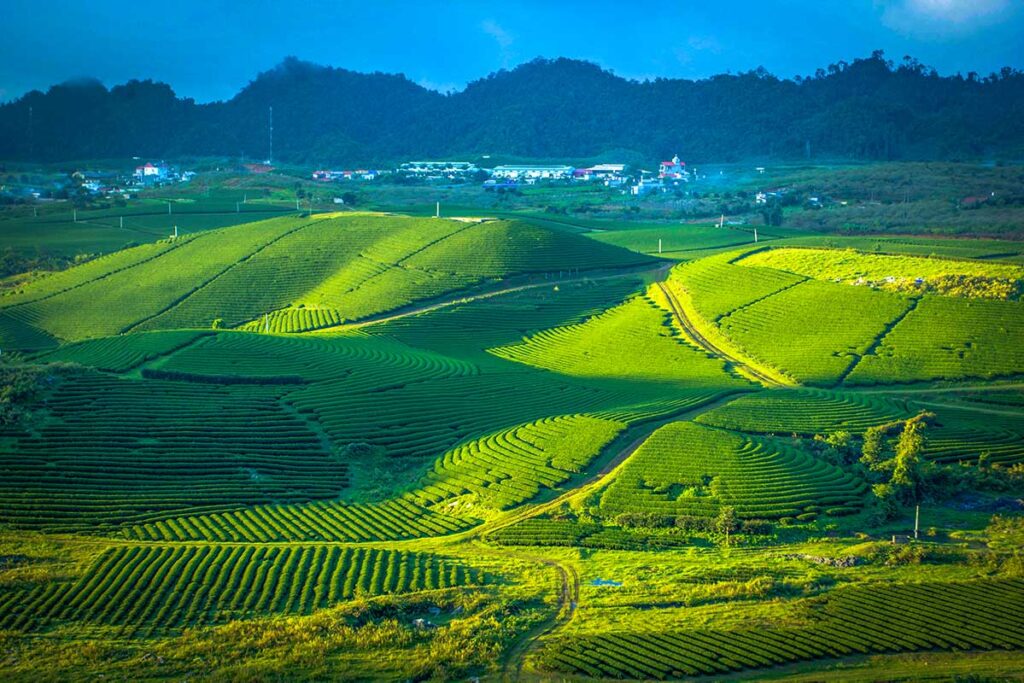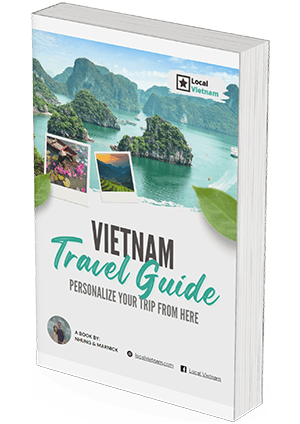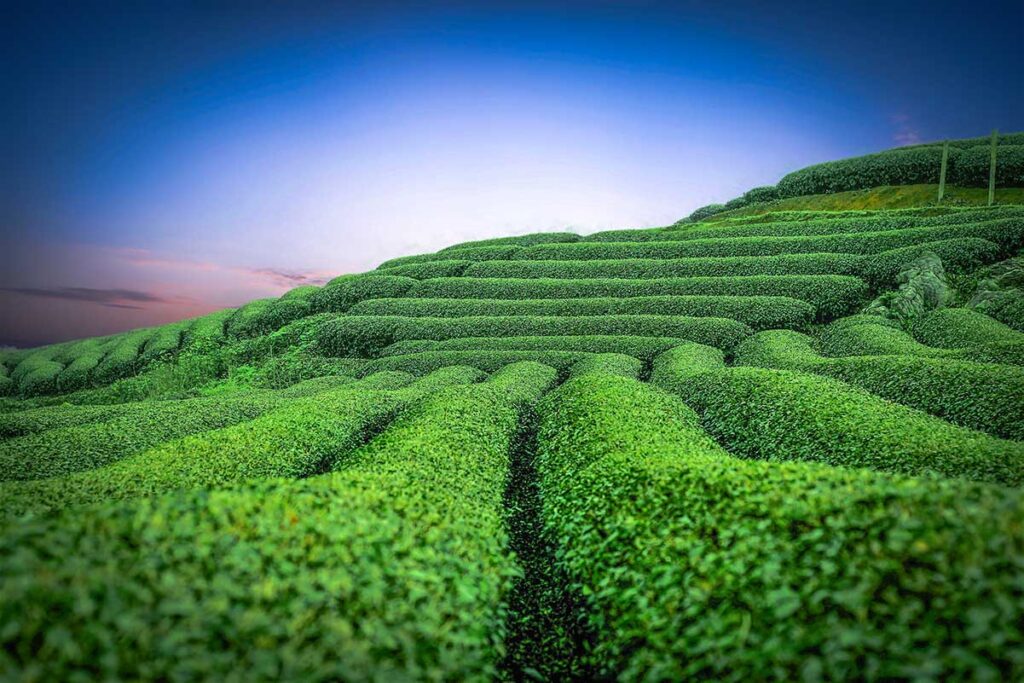Moc Chau Plateau – Home to Vietnam’s Iconic Tea Hills
Moc Chau Plateau sits at around 1,000 meters above sea level, giving it a fresh, temperate climate all year round. This unique geography has made it famous for tea plantations, dairy farms, and flower fields — often described as the “Da Lat of the North.” The area is home to ethnic Thai and H’mong communities, with quiet villages scattered between rolling green hills and pine-covered valleys.
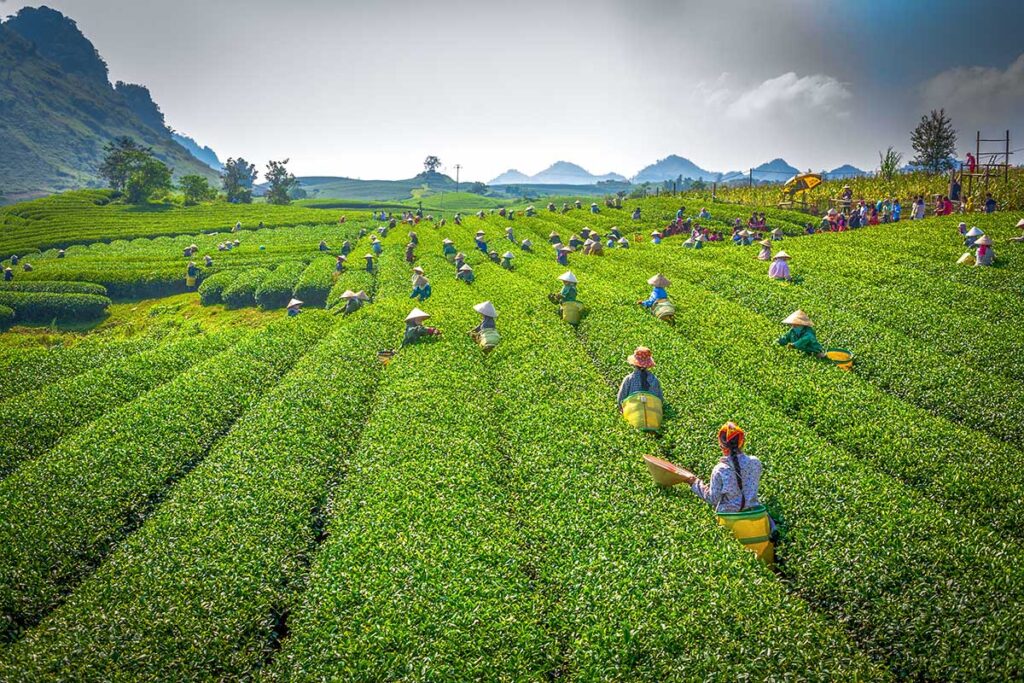
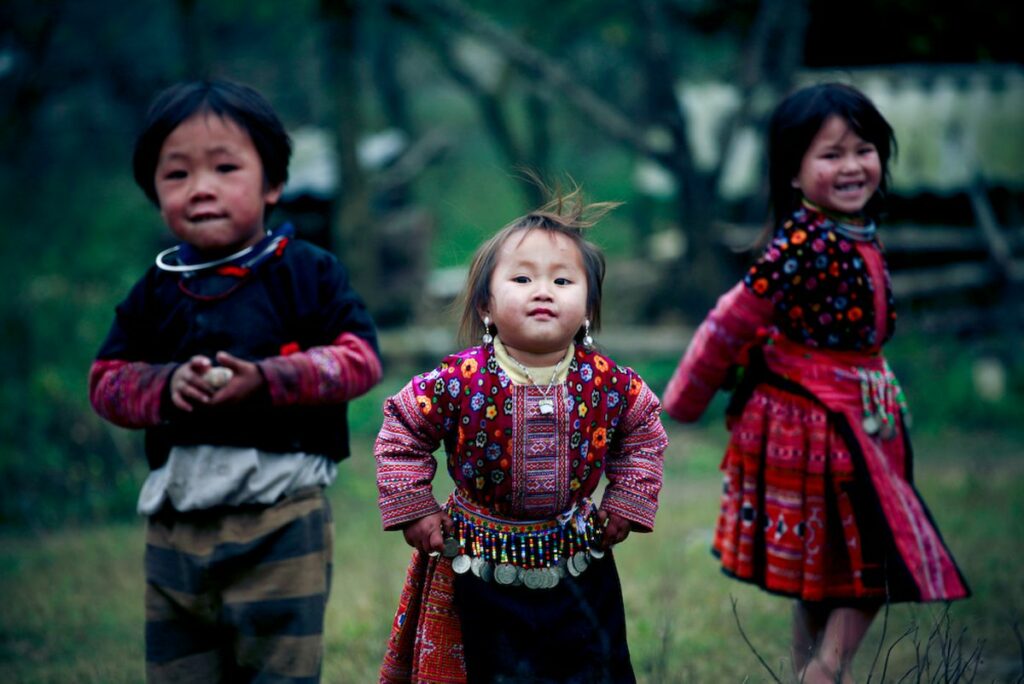
The town of Moc Chau itself is small and functional, but the real charm lies in the surrounding landscapes: misty mornings, winding rural roads, and seasonal bursts of white plum blossom or golden mustard flowers. Whether you’re here for a few peaceful days or using it as a base for trekking to places like Pha Luong Peak or Ta Xua, there are plenty of rewarding things to do in Moc Chau — especially if you enjoy nature, local culture, and off-the-beaten-track travel.
Best time to visit Moc Chau
Moc Chau has a mild, highland climate that makes it a pleasant destination year-round. Winters (December to February) are cold and misty, while summers (May to August) are warm but rarely humid like the lowlands. The most popular time to visit is during flower season — especially February to March, when plum blossoms, peach blossoms, and white orchids bloom across the plateau.
Another seasonal highlight is the Hết Chá Festival, celebrated by the Thai ethnic group in late March. If you’re after golden rice fields, aim for late September to early October, while November is known for wild sunflower and canola blooms.
Each season brings something different — but for flower lovers, early spring is unmatched.
Read our full guide: Best time to visit Moc Chau
Best things to do in Moc Chau
Moc Chau is one of the most scenic regions in northern Vietnam, known for its green tea hills, flower valleys, and refreshing highland atmosphere. Whether you’re after quiet landscapes or local culture, there are plenty of things to do in Moc Chau to fill two or even three rewarding days. This section explores the most memorable experiences — from iconic viewpoints and hidden waterfalls to tea plantations and ethnic villages.
1. Visit the tea plantations
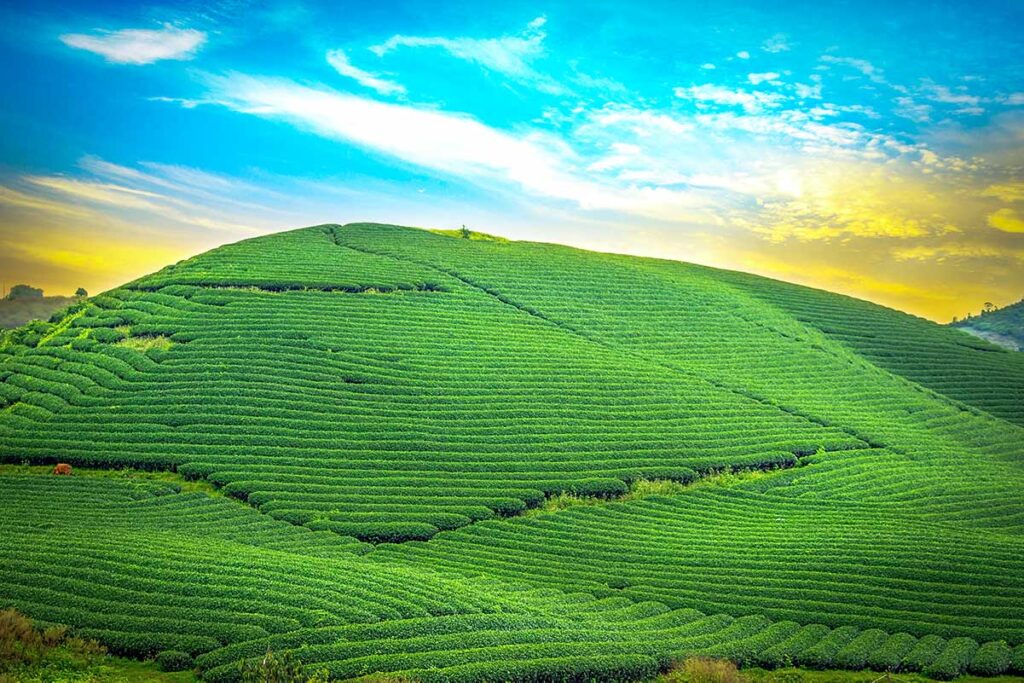
Moc Chau is most famous for its rolling tea hills, which stretch over thousands of hectares and shape the region’s identity. Thanks to the cooler climate and elevation, this is one of Vietnam’s largest tea-growing regions, producing green, oolong, and black teas. You’ll often see local workers in conical hats harvesting leaves by hand, especially in the early mornings.
Some of the best places to explore these plantations include:
- Heart Tea Hill (Đồi Chè Trái Tim) – The most photographed tea hill, shaped like a heart and popular for wedding shoots.
- Mộc Sương Oolong Plantation – Known for its high-quality oolong tea, this private plantation welcomes visitors with permission and has impressive, neatly trimmed tea rows on the hillsides.
You’ll spot tea hills throughout the district, especially near Tan Lap and Dai Loan areas. Some plantations allow you to walk through the fields or buy tea directly from the producers.
2. Explore ethnic culture and local villages
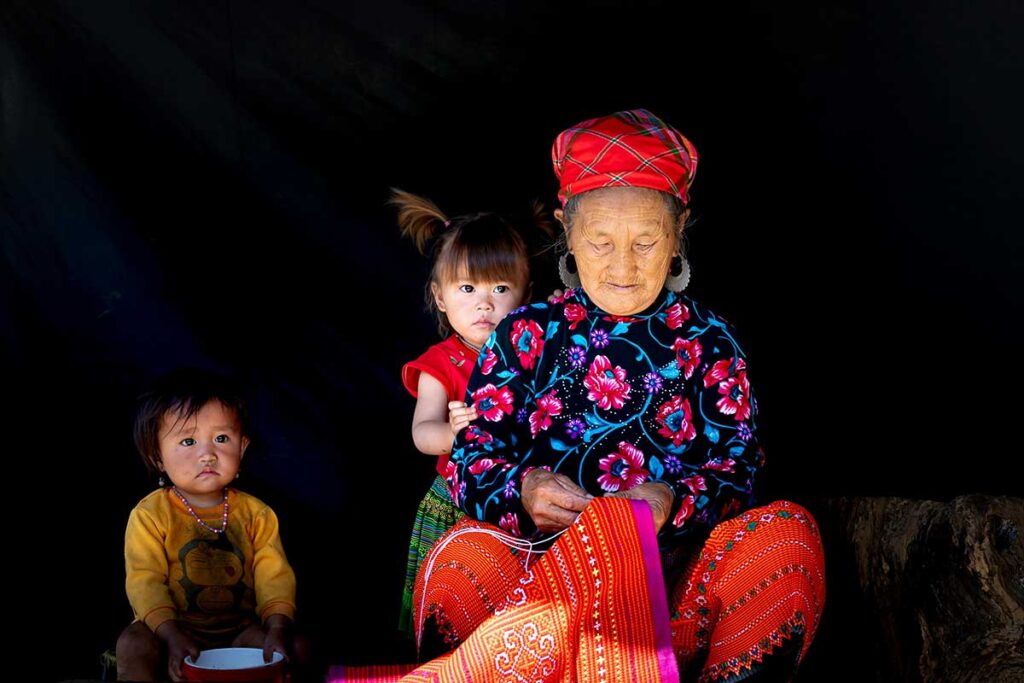
One of the most surprising things about Moc Chau is how different life looks just a few kilometers outside town. The region is home to several ethnic groups such as the H’Mong, Thai, Dao, and Muong. These communities live in traditional stilt houses, wear colorful handmade clothing, and farm the land in remote valleys and mountains. Visiting their villages offers a glimpse into a way of life that’s very different from Vietnam’s cities or coastal regions.
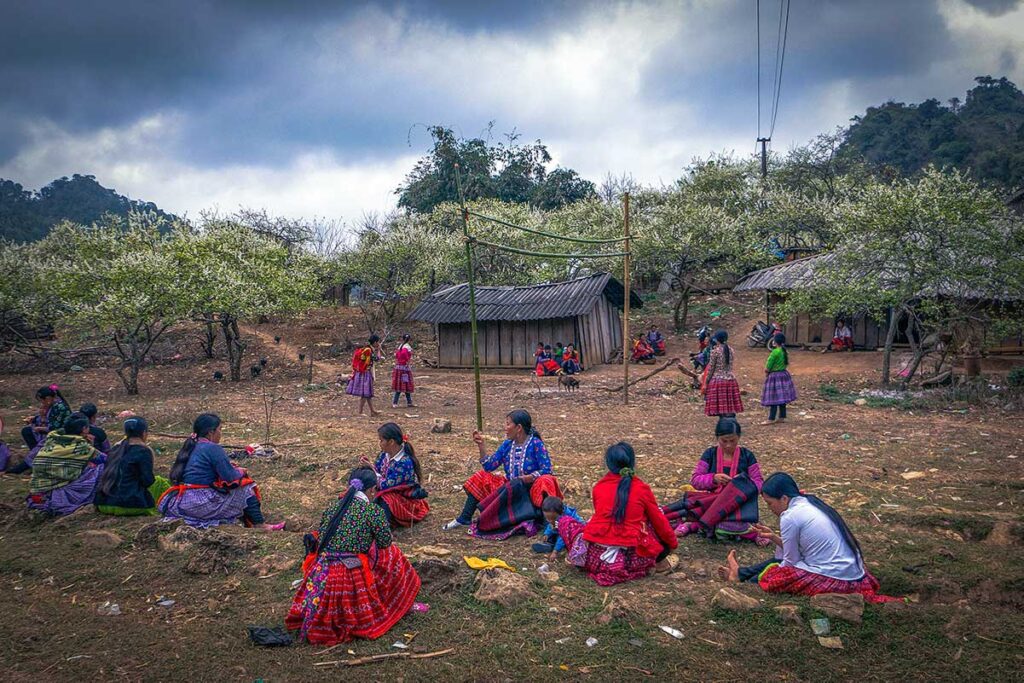
Some villages worth visiting include:
- Pa Phách Village – A peaceful H’Mong village surrounded by plum trees that bloom beautifully in spring.
- Thung Cuông Village – Known for its seasonal cabbage and flower fields, often visited by Vietnamese photographers.
- Tà Số – A more remote valley where life feels untouched by mass tourism; ideal if you’re looking for something off the beaten path.
- Ban Ang Village – A Thai village near the pine forest, known for traditional stilt houses and quiet rural life.
- Long Luong – A roadside H’Mong village often seen on the drive from Hanoi, with misty hills and terraced farms.
Markets in and around Moc Chau are smaller than those in places like Ha Giang, but they’re still worth a visit. On market days, people from surrounding villages come to trade vegetables, herbs, livestock, and handmade goods — often dressed in traditional outfits, especially the H’Mong.
3. Walk across the Moc Chau Glass Bridge
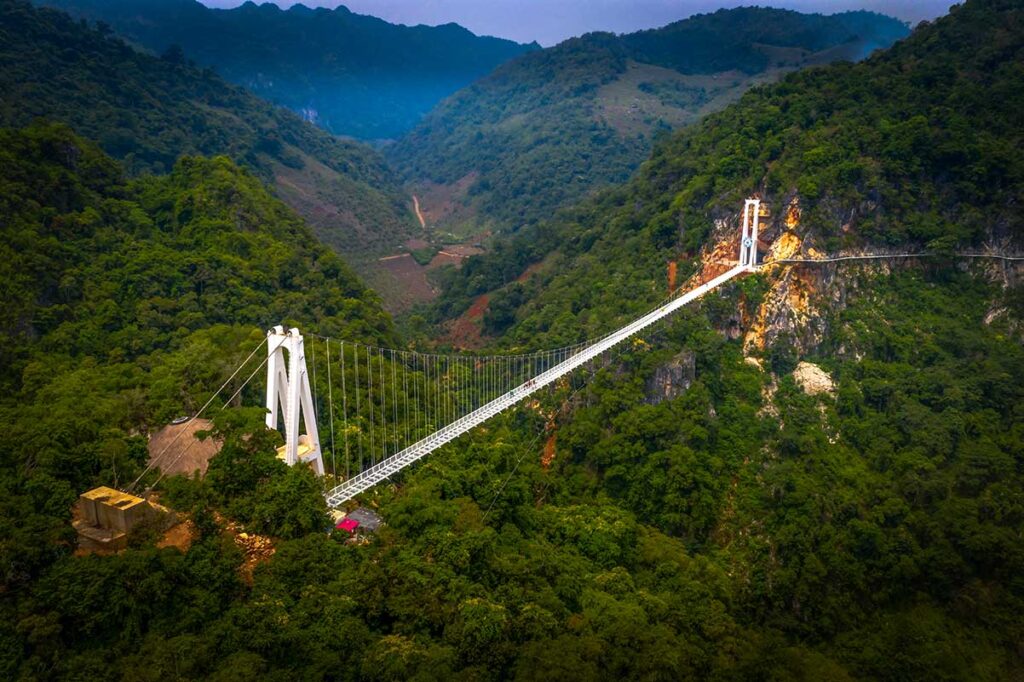
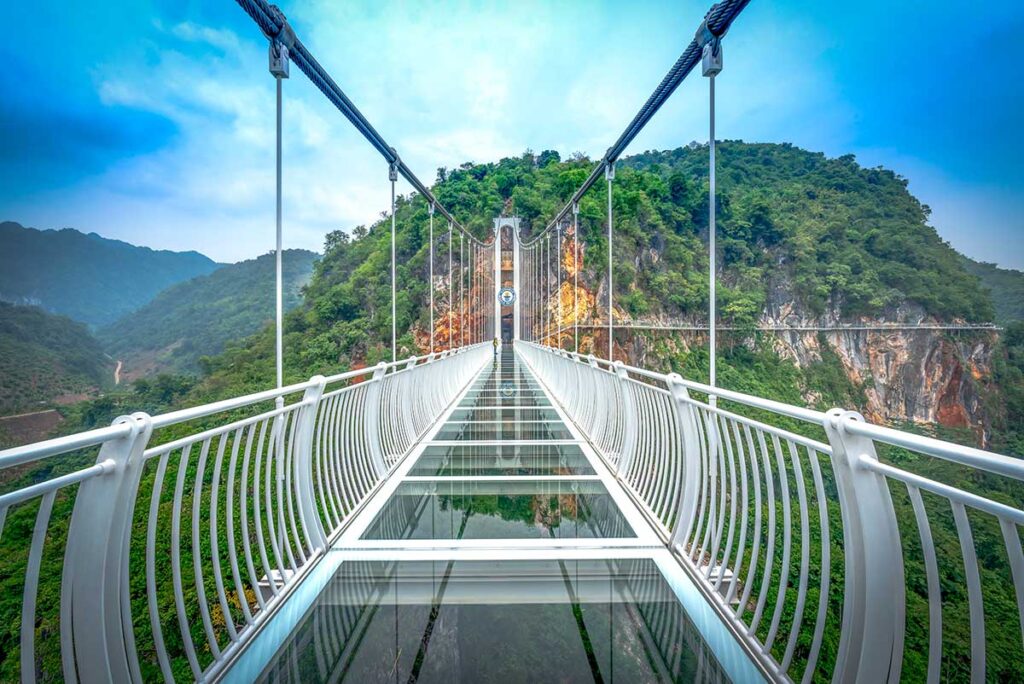
The Bach Long Glass Bridge, one of the best things to do in Moc Chau, holds the record as the longest glass bridge in the world, stretching 632 meters across cliffs and a deep forest valley. Walking across it is a thrilling experience — the glass floor gives the illusion of walking in the sky, especially exciting (or nerve-wracking) for those afraid of heights.
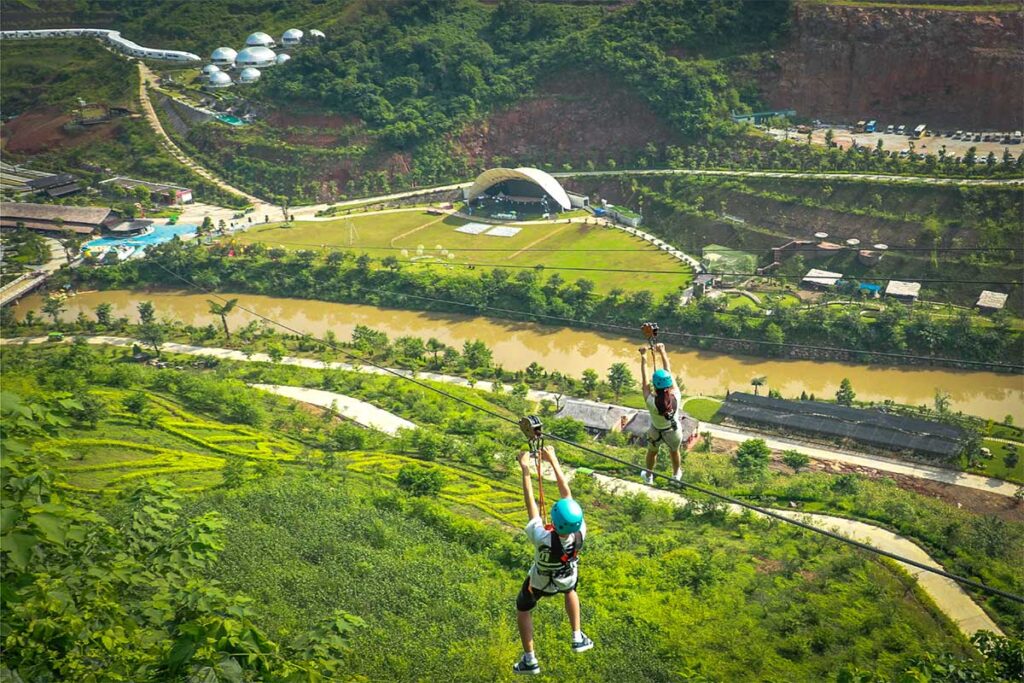
The bridge is part of a larger tourist park with other attractions such as a zipline, go-kart track, rainbow slide, and cliffside walkways. It’s a popular spot for domestic tourists, especially on weekends. Expect an amusement-park atmosphere and prepare for entrance fees at various sections.
→ See our full guide to the Bach Long Glass Bridge for prices, tips, and honest impressions.
4. See the plum and peach blossoms in Spring
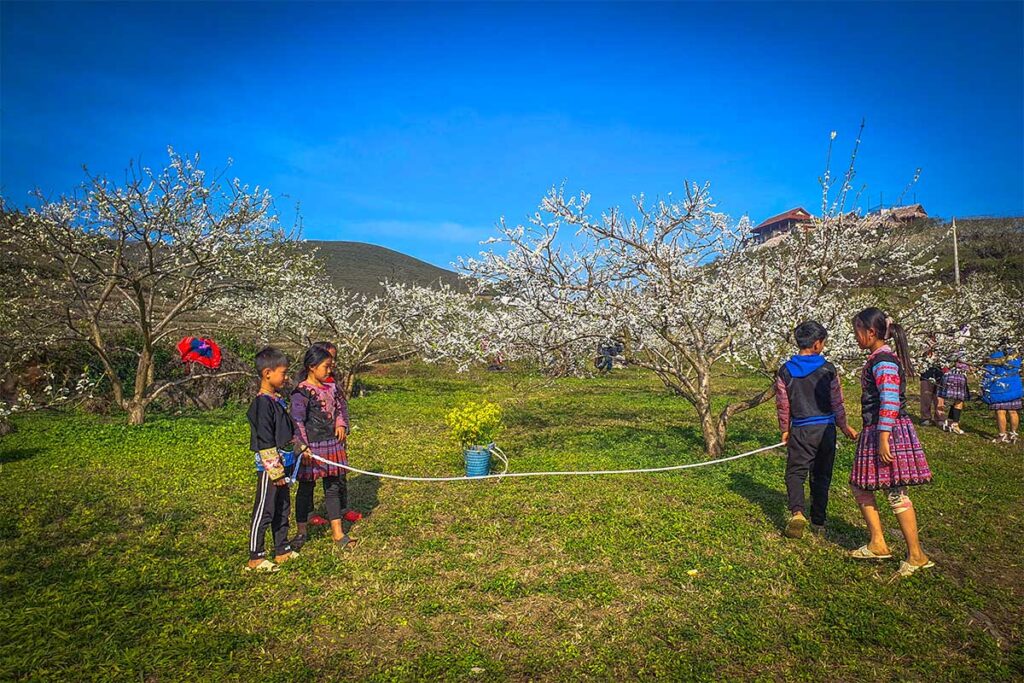
Moc Chau is one of the most famous places in Vietnam to see plum and peach blossoms. Every year between late December and February, the valleys and hillsides turn white and pink as trees bloom, drawing thousands of photographers and families. Around this time, you’ll also find fields of buckwheat, white mustard, and other flowers planted for the spring season.
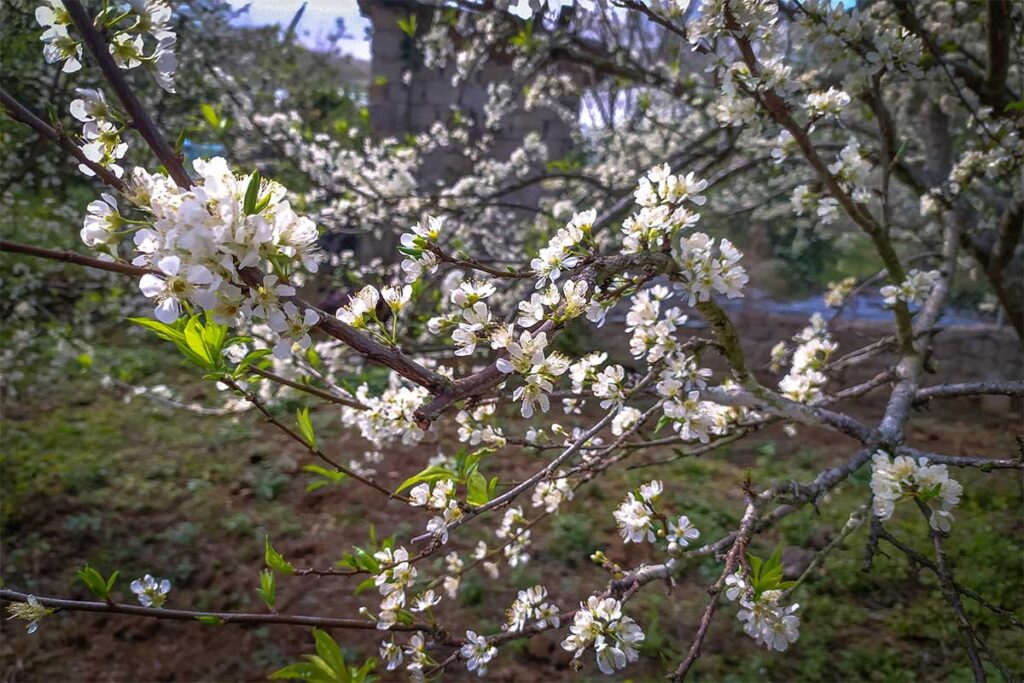
The most famous area is Na Ka Plum Valley, with sweeping views and many small farms welcoming visitors to walk among the blossoms. However, it can get crowded, and some farms charge entrance or parking fees, especially during peak bloom. Outside the blossom season, it’s quieter — and you can often find equally scenic valleys elsewhere without the crowds. Just driving around the countryside in spring can be a highlight in itself.
5. Take a dip at Chieng Khoa Waterfall
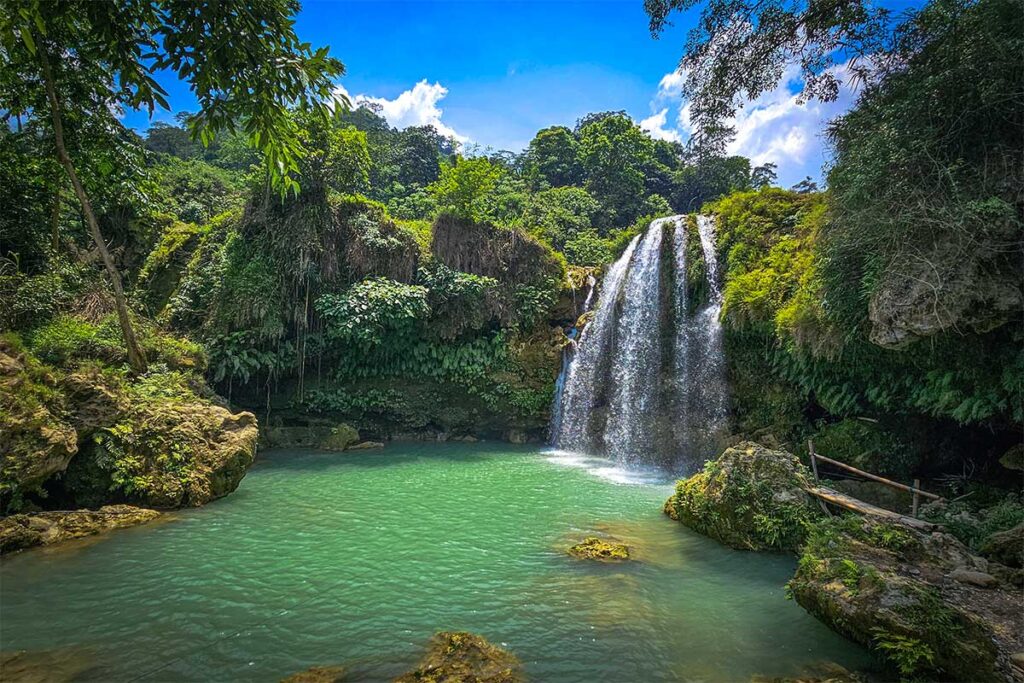
Chieng Khoa Waterfall, also called Thác Chiềng Khoa, is a multi-tiered cascade surrounded by greenery and limestone cliffs. The turquoise pools at its base make it one of the best things to do in Moc Chau on a hot day — and a great place to swim and cool off in a natural setting.
It’s located about an hour’s drive from Moc Chau town, along a scenic countryside route. The area is not overly developed, but it’s become popular with domestic travelers, especially on weekends. Expect some crowds, but also plenty of space to relax. Bring swimwear, snacks, and water, as there are only a few basic stalls near the parking area.
6. Trek or Cloud Hunt in Ta Xua (Day Trip or Overnight)
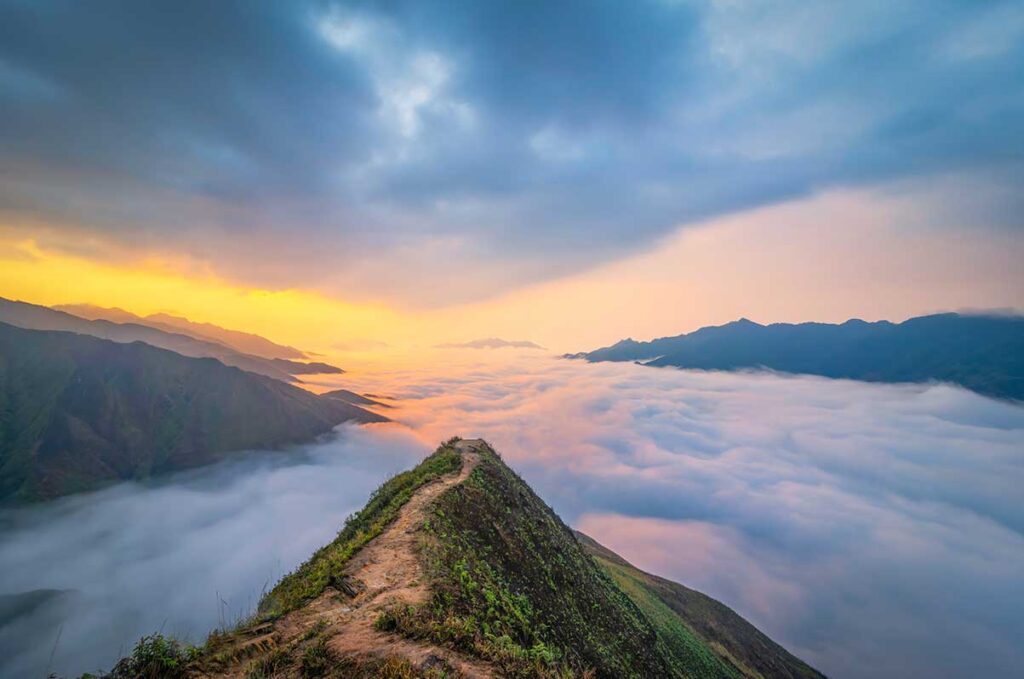
Ta Xua is best known for cloud hunting — an early-morning phenomenon where valleys fill with thick layers of mist, creating the surreal impression of walking above the clouds. Located about 130 km (3.5 hours) from Moc Chau, it’s part of Son La Province and worth considering for a day trip or overnight stay. It would easily top the list of best things to do in Moc Chau if it weren’t quite so far away.
Ta Xua is also a great area for trekking, with trails that pass through remote villages, forests, and rocky ridges. While some spots are accessible by motorbike or car, others require hikes or local guides. For those staying overnight, simple homestays are available in Ta Xua village or nearby.
→ See our full Ta Xua travel guide for more info, route tips, and seasonal advice.
7. Hike to Pha Luong Peak (Permit required)
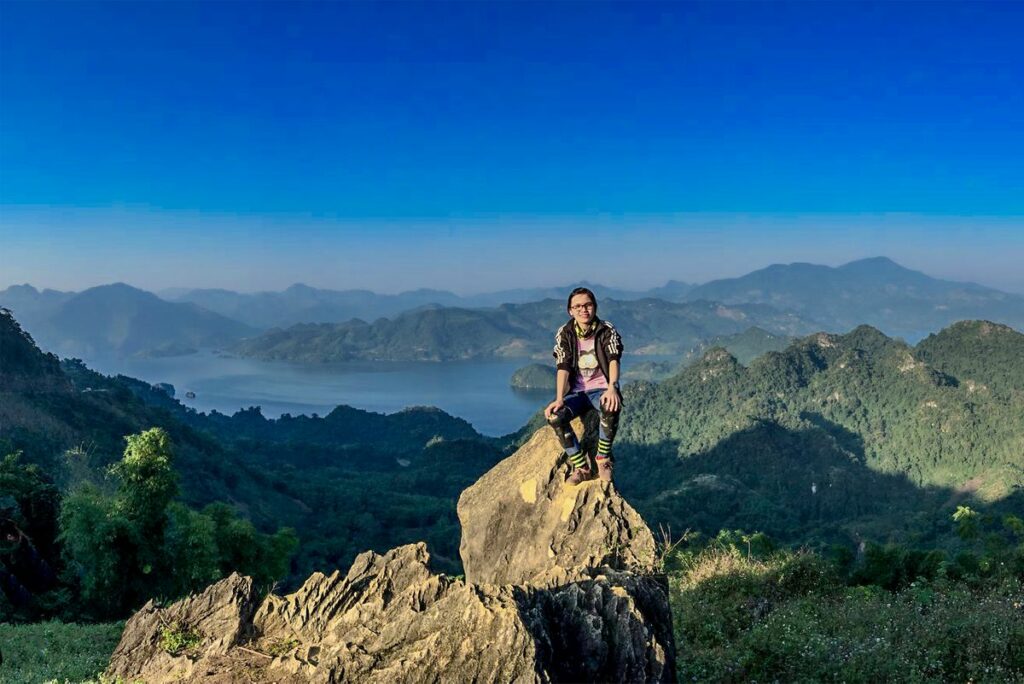
Pha Luong Peak, known as the “roof of Moc Chau,” rises nearly 2,000 meters near the Laos border. Its flat rocky summit offers sweeping views of rugged mountains and mist-filled valleys, making it one of the most iconic trekking destinations in northern Vietnam.
If it weren’t for the required military permit, this would easily rank among the best things to do in Moc Chau for outdoor lovers. The hike is steep and challenging, usually taking 4–6 hours round-trip, but the panoramic reward is worth the effort. To climb Pha Luong, you’ll need to apply in advance and register at the local border post.
→ For detailed instructions, see our full guide to hiking Pha Luong Peak.
8. See the Dai Yem Waterfall
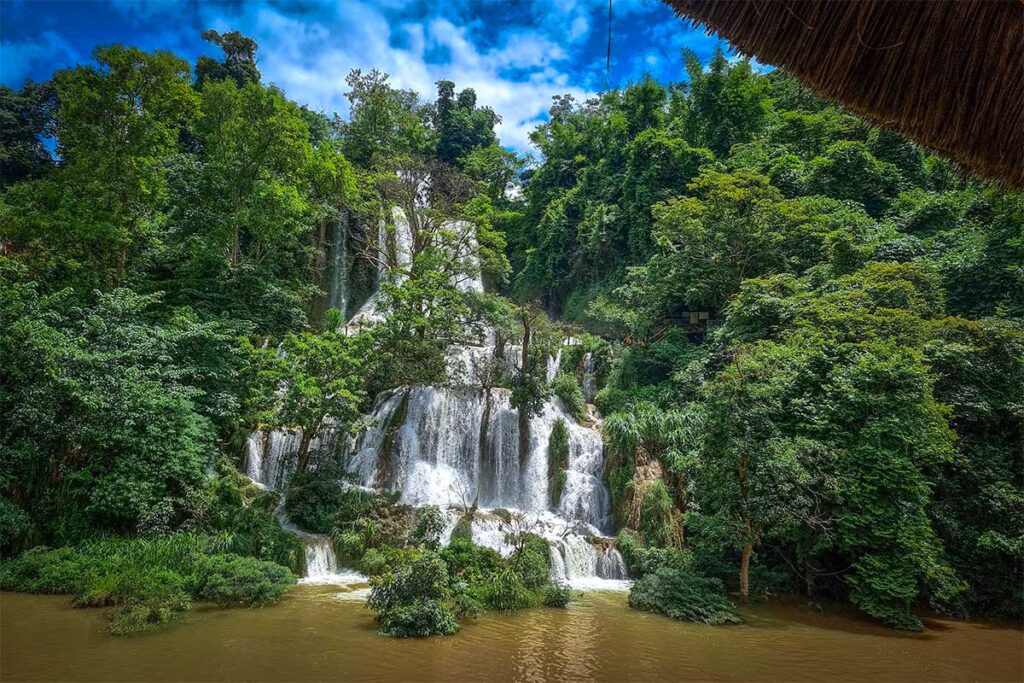
Dai Yem Waterfall is one of the most accessible natural sights near Moc Chau town. Often called the “Pink Blouse Waterfall,” it’s known for its layered cascades and clear pools surrounded by greenery. While it’s located close to the Glass Bridge, it’s not part of the same amusement complex — entry is separate.
It’s easy to include this in a short trip, especially if you’re staying in town. While the falls are beautiful, the area around it feels commercialized, with extra fees for attractions like the nearby glass bridge. Still, on a hot day or for a relaxing walk, this is one of the better-known things to do in Moc Chau — just don’t expect a remote nature escape.
9. Visit the dairy farms (Try local milk and Yogurt products)
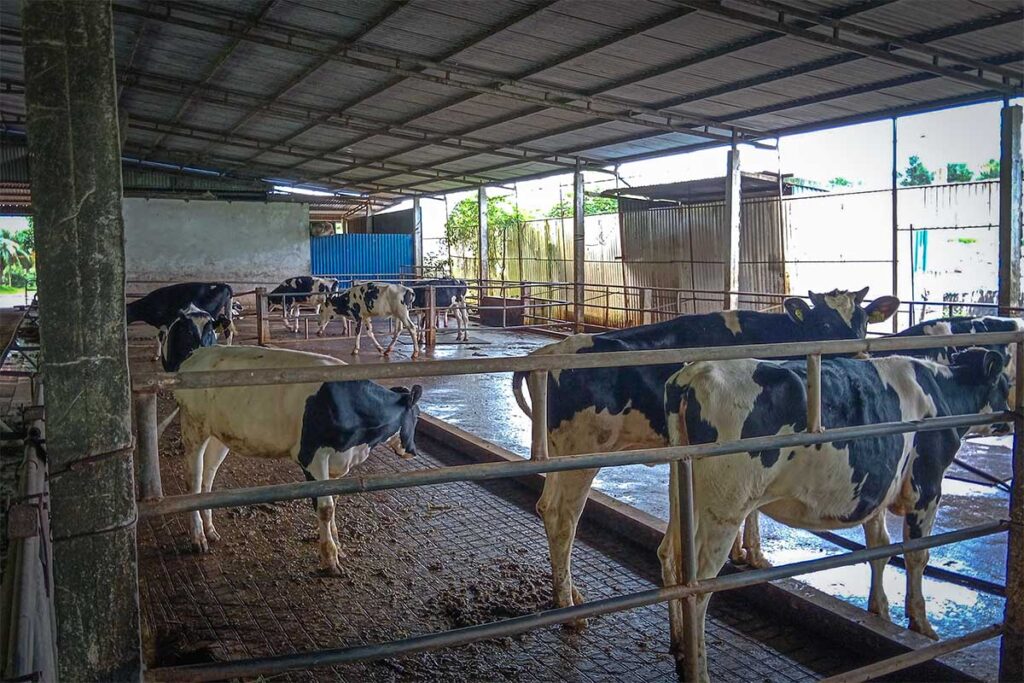
Moc Chau is not only famous for tea — it’s also one of Vietnam’s biggest dairy farming regions. Local milk, yogurt, and ice cream are sold throughout town, and you can stop by small dairy farms to sample products and learn more about local agriculture.
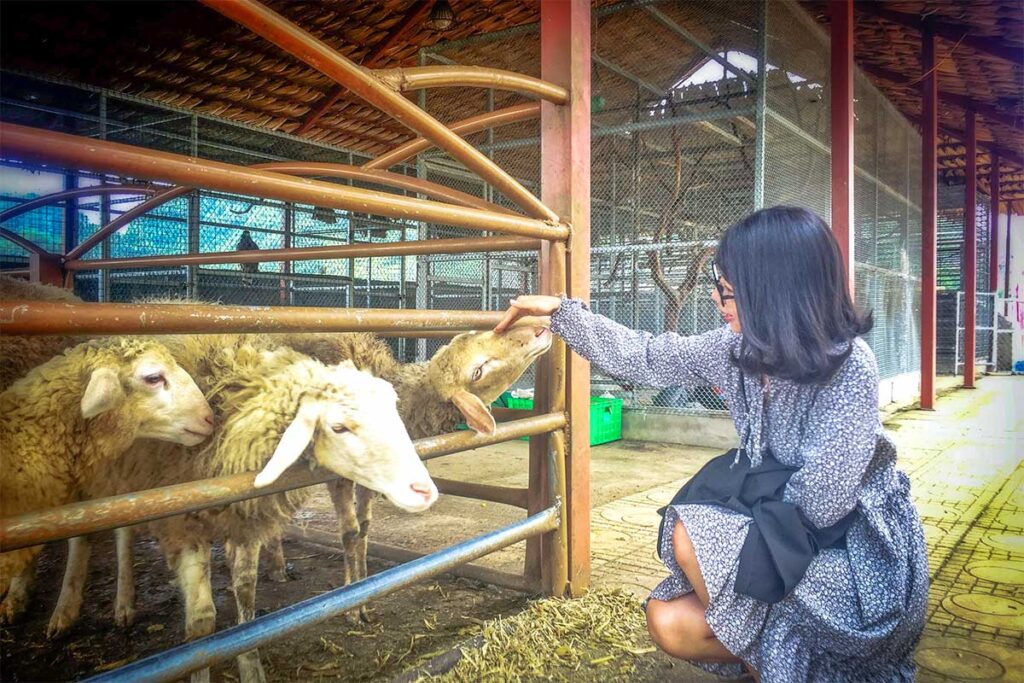
While some farms lean heavily toward domestic tourism with photo zones and petting areas, others offer a more relaxed atmosphere. Searching for “trang trại” (farm) on Google Maps will show several options. It’s not the most exciting activity, but if you enjoy tasting local food or traveling with kids, it’s a low-key addition to your list of things to do in Moc Chau.
10 Explore Moc Chau’s hidden caves
Moc Chau has a few interesting caves worth visiting if you’re nearby, especially for those looking to break up their nature itinerary with something different. While they don’t compare in scale to the caves of Phong Nha, they’re still scenic and atmospheric.
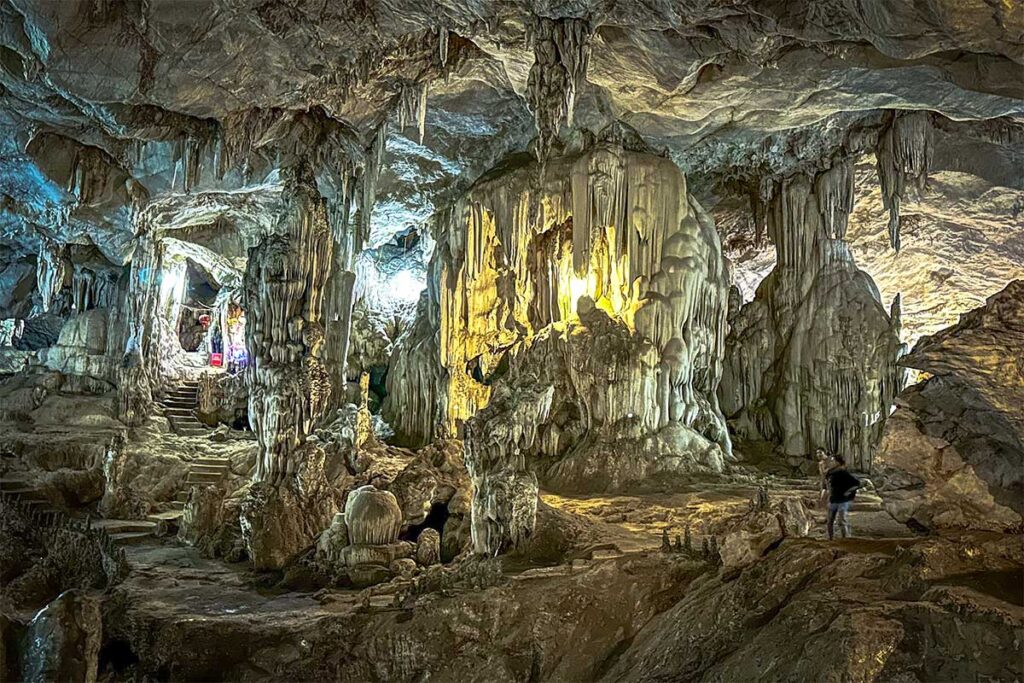
The most accessible option is Son Moc Huong (Hang Dơi / Bat Cave), located northeast of the town. With impressive stalactites and a wide, echoing chamber, it’s reached by climbing 240 stone steps from the main road.
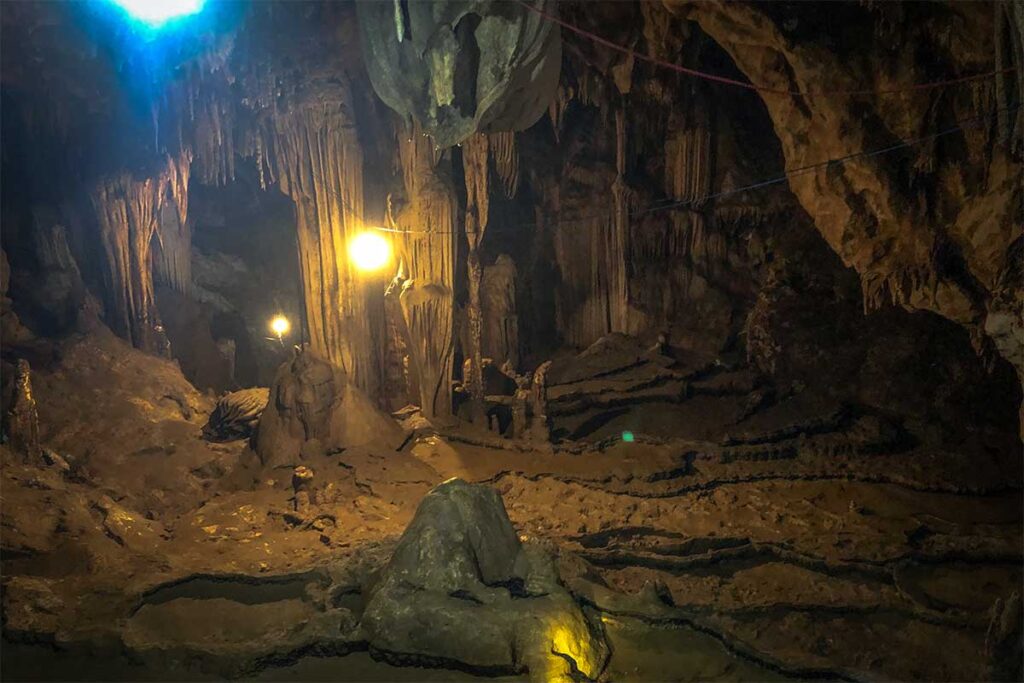
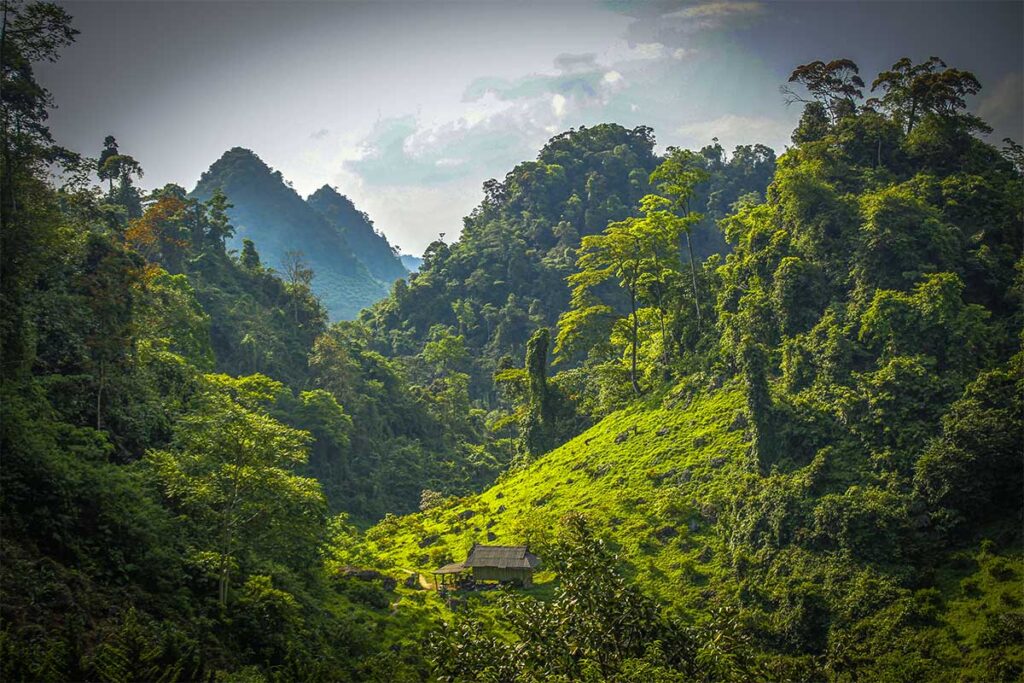
A more off-the-beaten-track alternative is Ngu Dong Ban On, a cluster of five caves symbolizing the five natural elements. These caves are less developed and harder to reach but offer a raw and local experience.
11. Discover the remote beauty of Chien Yen
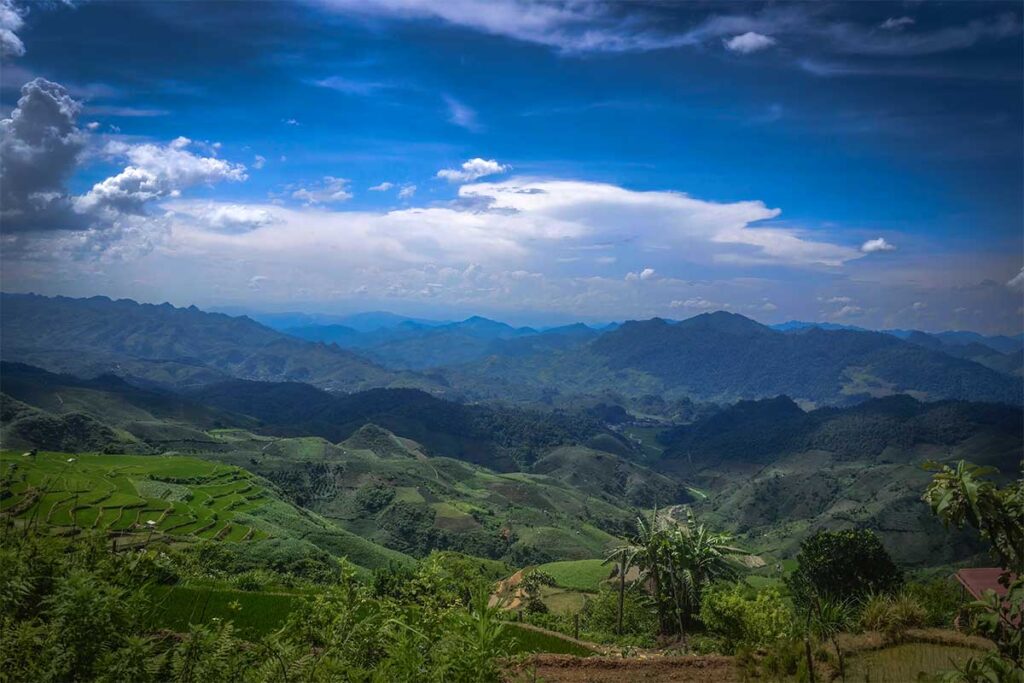
Tucked away between Moc Chau and Mai Chau, the Chien Yen area is one of the most rural and authentic parts of the area. It’s about an hour’s drive from the main town, but the reward is a peaceful valley filled with stilt-house homestays, quiet streams, and forested hills.
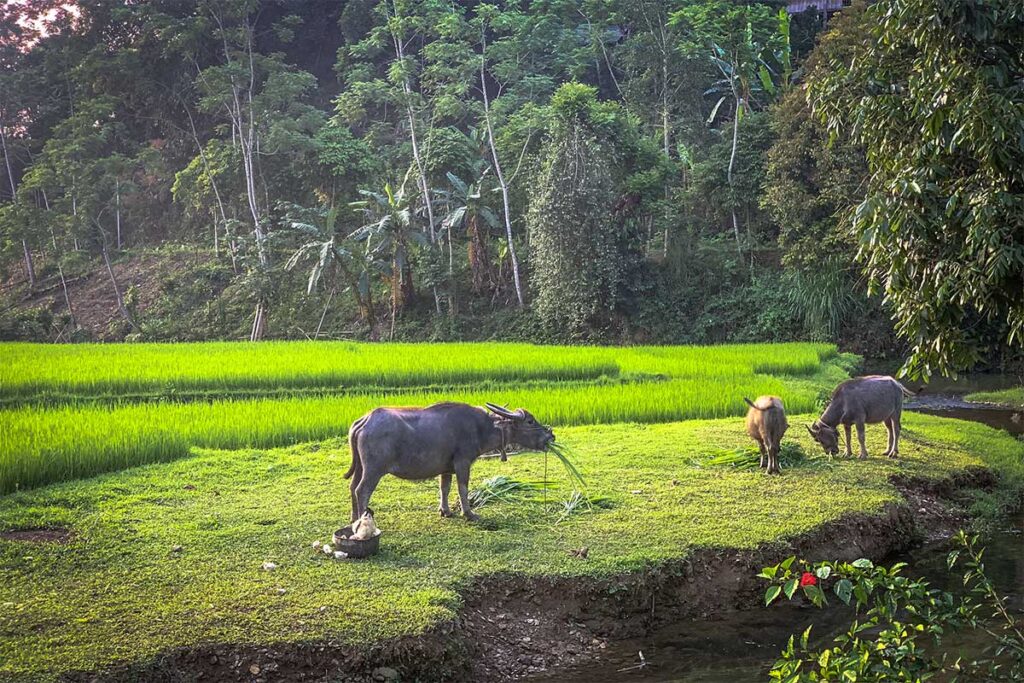
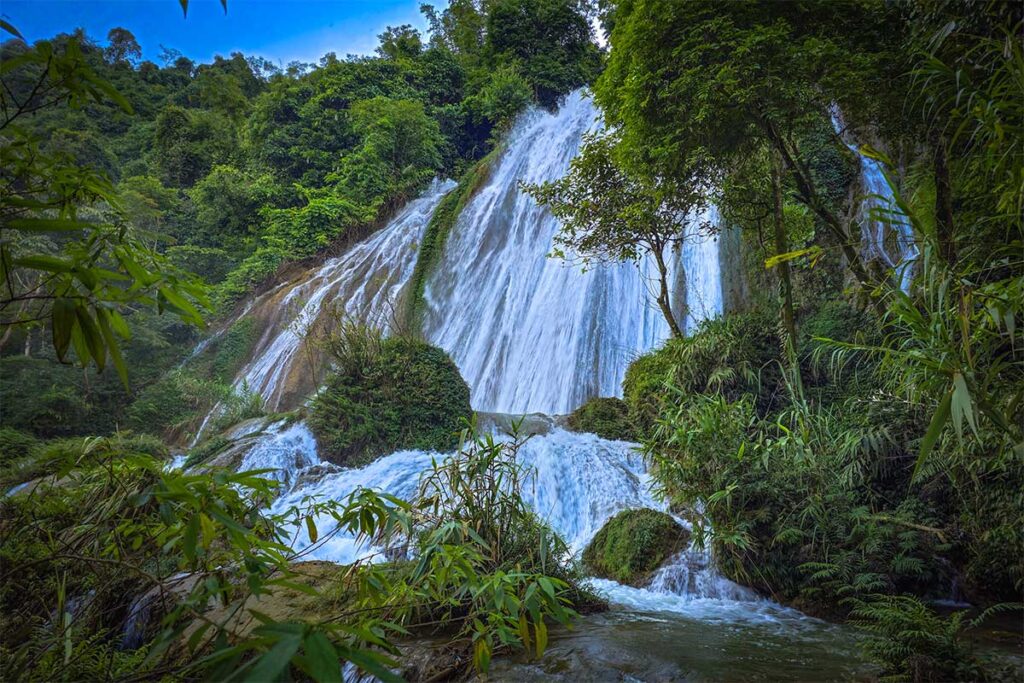
One of the standout attractions is Tat Nang Waterfall, a large, multi-level cascade with rocky pools and photo-friendly viewpoints. It feels untouched, though some bamboo bridges and paths may be rough. You’ll also find the Bo Am hot spring, a warm natural pool perfect for a relaxing soak — just be cautious on the narrow access road. For those looking to explore further, this is one of the most off-the-radar things to do in Moc Chau District.
→ See our full Chien Yen guide for routes, accommodations, and activity suggestions.
12. Enjoy the view from Pa Phach Peak
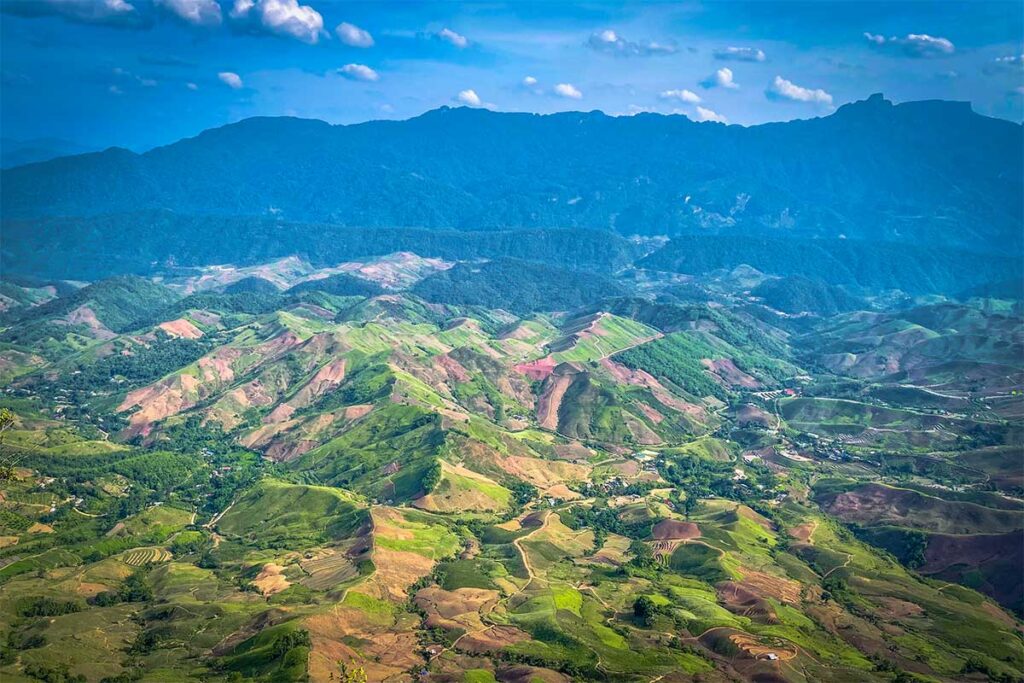
If you’re looking for a scenic viewpoint without needing a hiking permit, Pa Phach Peak is a great alternative to Pha Luong. Located about 40 minutes from Moc Chau town, this high ridge offers panoramic views of cloud-filled valleys and layered mountains — especially magical during the early morning or late afternoon.
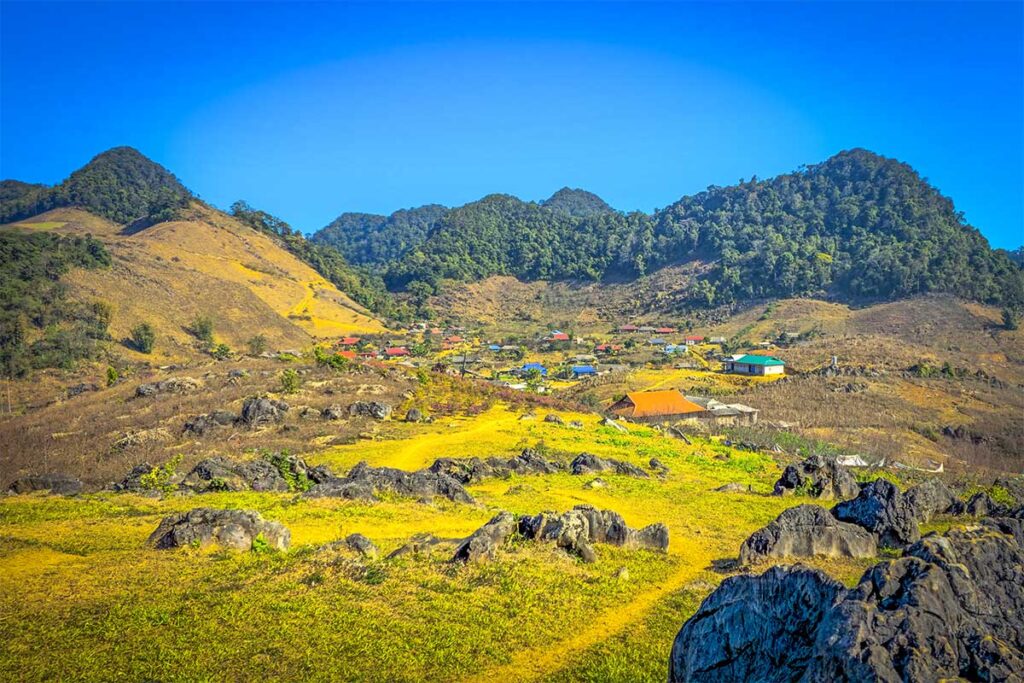
You can drive most of the way to the top by car or motorbike, with only a short uphill walk to the best viewpoints. The road can be muddy or slippery in the rainy season, but the dramatic scenery makes the journey worthwhile. It’s a lesser-known spot, but one of the most rewarding places to take in Moc Chau’s landscape.
13. Stay in a local ethnic homestay
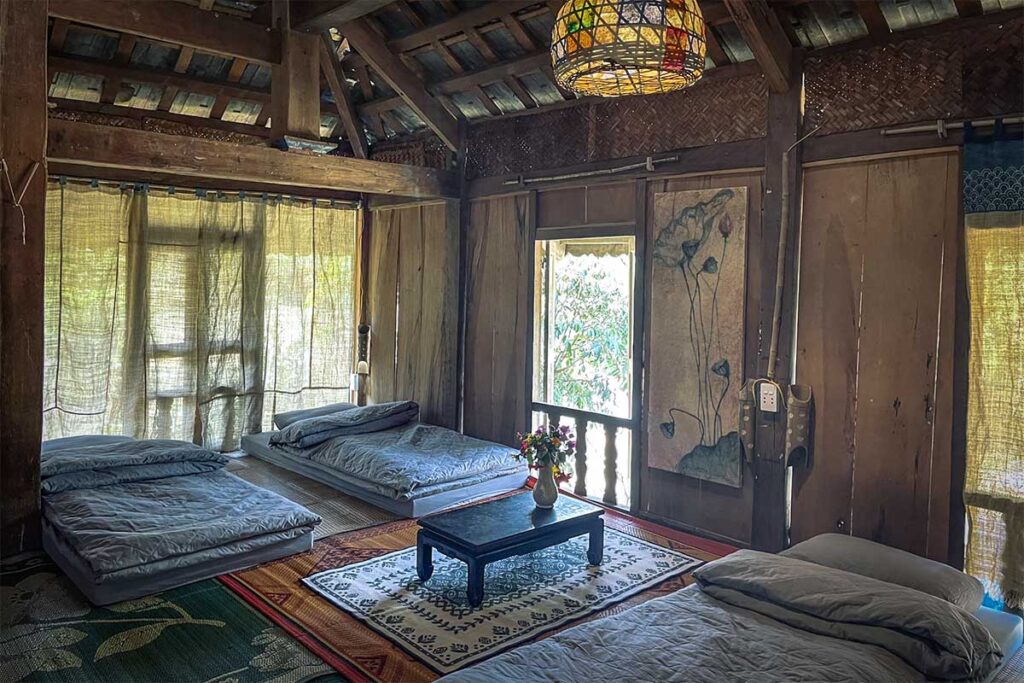
Spending the night in Moc Chau is easy — there are plenty of small, cozy homestays scattered across the region. But if you want something more than just a bed for the night, consider staying with a local ethnic minority family. It’s not just accommodation; it’s one of the most meaningful things to do in Moc Chau.
These family-run homestays offer a basic but genuine experience. You’ll sleep in traditional wooden stilt houses, share home-cooked meals, and get a glimpse into the daily life of Thai or Hmong communities. From joining a family dinner to learning about customs and traditions, the experience is quiet, slow-paced, and deeply local. Just be sure to check in advance — not all places labeled as “homestays” offer this kind of cultural connection.
14. Cycle or ride through Ban Ang Pine Forest
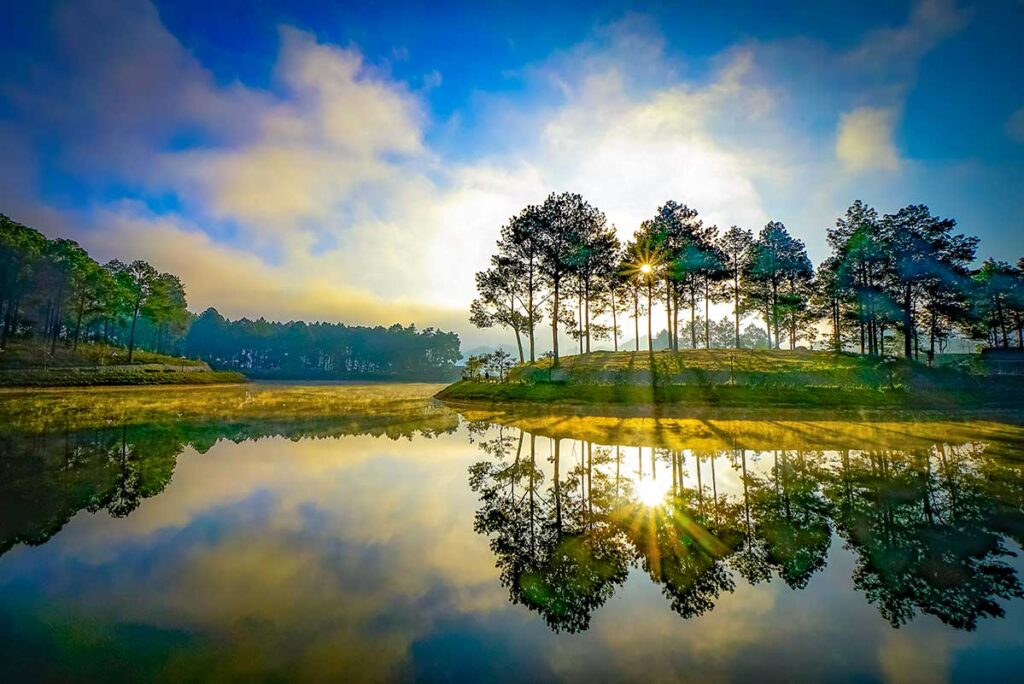
Ban Ang Pine Forest sounds more natural than it actually is. While the name suggests a peaceful forest, it’s more of a park-style attraction, complete with cafés, rides, photo zones, and lakeside paths. For Vietnamese families, it’s a top destination — but foreign visitors often find it too artificial.
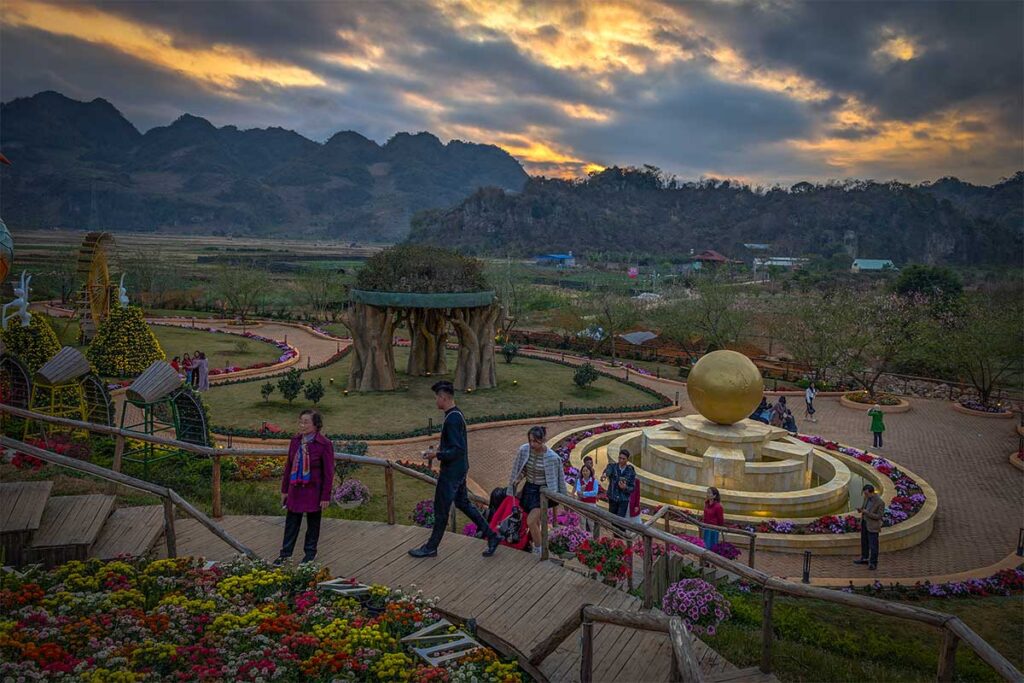
That said, it can still be worth a short visit, especially if you’re traveling with kids or want a leisurely bike ride. You can rent an electric bicycle, walk around the lake, or visit nearby strawberry gardens. Just don’t expect untouched forest — this is a curated attraction aimed at the domestic market.
Where to stay in Moc Chau
Moc Chau offers a wide mix of accommodations, from local homestays to boutique hotels. Where you stay can shape your entire experience, so it’s worth understanding the differences between the main areas.
Moc Chau Town
This is the central area with the most urban feel. While it’s not a charming mountain town, it’s convenient — especially if you want to be close to shops, restaurants, and transport connections. Most hotels here are small and simple, but there are also a few comfortable options with better amenities.
Moc Chau Farm Town
Just a few minutes outside the main town, this area offers a more relaxed setting but still has many accommodations. It’s still close to many highlights like the tea hills and Dai Yem Waterfall. If you want a quieter base without being too remote, this is a good middle ground.
Rural Villages and Countryside
For a more local and authentic experience, consider staying further out in the countryside. Areas like Chien Yen offer peaceful scenery, traditional stilt houses, and a chance to see everyday rural life. Many places here are more basic, but the experience itself — waking up to mountain views, hearing roosters at dawn, and sharing meals with a host family — can be more memorable than visiting the big-name attractions.
Just keep in mind that these areas are often a bit farther from the main sights, so plan for longer drives or transfers if you want to explore widely.
How to get there
Moc Chau does not have an airport or railway station, for this reason you always have to travel over the road. The town is located 190 kilometres from Hanoi.
Plan a custom trip to Moc Chau
Prefer everything arranged in one go? We can organize transfers from Hanoi, transport in Moc Chau, and a full sightseeing plan — all tailored to your travel style.
Busses to Moc Chau
The distance between Hanoi and Moc Chau is 190 km, so it takes around 4 to 5 hours to get there. Every day a number of buses leave for Moc Chau. Most start from the My Dinh bus station in Hanoi. All buses to Son La and Dien Bien Phu also always pass by Moc Chau.
Alternatively you can take a direct tourist minibus including pick up and drop off at your accommodation.
Read also our full guide about: from Hanoi to Moc Chau (include tips of best buses and where to book tickets)
How to get around Moc Chau
To properly explore the Moc Chau region, you’ll need your own transport. Public transport is limited to the main highway, and most attractions are scattered across the countryside.
Renting a motorbike or scooter
Most hotels and homestays rent out scooters for around 250,000 VND per day. It’s a popular option, especially among domestic tourists and confident international riders. But be aware: many rural roads are in poor condition. While the main roads are paved and decent, smaller side roads can be bumpy, steep, or muddy — especially after rain.
If you don’t have experience driving a scooter in Vietnam, this might not be the best place to start. But if you’re confident and cautious, riding a motorbike gives you flexibility and freedom to explore lesser-visited spots on your own terms.
Hiring a car with driver
For a more comfortable option, you can arrange a private car with driver. This is ideal for sightseeing — especially if you want to visit multiple places in a day, like tea plantations, waterfalls, and local farms.
It’s very different from taking a taxi. With a private car, you’ll agree on a route and price in advance, so there are no surprises. While it’s less adventurous than riding a motorbike, it’s safer, more convenient, and allows you to relax and enjoy the scenery.
Itinerary 2 days in Moc Chau
Read this itinerary to know what to do in Moc Chau in 2 days. If you have more time, visit Ta Xua. Ta Xua is not close at all, with more than 130km from Moc Chau town. If you want to go here, it is best to stay nearby the day before, to get up the mountain early and see the beautiful clouds.
Day 1
- Morning: Visit Heart Tea Hill and Moc Suong Oolong Plantation
- Late morning: Stop by Dai Yem Waterfall and optionally walk the Glass Bridge
- Afternoon: Explore Na Ka Plum Valley (in season) or Ban Ang Pine Forest
- Late afternoon: Visit a local farm for fresh milk or yogurt
- Evening: Stay at a local homestay, enjoy family dinner and cultural interaction
Day 2
- Early morning: Optional sunrise trip to Pa Phach Peak (permit needed) or Pa Phach Peak (no permit needed)
- Late morning: Discover Son Moc Huong (Bat Cave) or Ngu Dong Ban On
- Afternoon: Cool down at Chieng Khoa Waterfall (1-hour drive from town)
- Late afternoon: Return to town or continue to next destination
Tips for traveling to Moc Chau
Where to go next
Moc Chau is a great stopover or launch point for exploring northwest Vietnam. On the way from Hanoi, you can easily combine it with Mai Chau, a scenic valley known for stilt house villages. From Moc Chau, it’s possible to continue deeper into the mountains toward Son La, Dien Bien Phu (300 km), or Mu Cang Chai (200 km), home to some of Vietnam’s most stunning rice terraces. Just note: travel times are long, so plan for 5–7 hours of mountain driving.
Language
Most travelers in Moc Chau are Vietnamese, and English is rarely spoken — especially in villages and smaller accommodations. Be patient, bring translation apps, and consider booking tours or homestays that can provide basic English support if needed.
Recommended days to stay
Two full days are enough to see tea hills, waterfalls, and scenic areas at a relaxed pace. If you plan to trek to Pha Luong Peak or Ta Xua, or want to dive deeper into ethnic culture, add an extra day or two.
Money and ATMs
There are ATMs in Moc Chau town and Farm Town, but almost nowhere else. Always carry enough cash when visiting waterfalls, villages, or remote areas — especially for entrance fees, meals, or homestays.
What to bring
Shops in Moc Chau are limited, so bring essentials:
- Sun protection and mosquito repellent
- Warm clothing in winter — it’s colder here than Hanoi
- Swimwear and quick-dry towel if visiting waterfalls
- Modest clothes for village visits (avoid short shorts/tank tops)
Food and drinks
Moc Chau has many simple local restaurants, but Western food is almost nonexistent. You’ll find dishes influenced by both Kinh and ethnic minority cuisines. If staying in a homestay, don’t miss the opportunity to enjoy home-cooked meals — often the most flavorful and memorable part of the trip.
